Principles of Management and their Application in L'Oreal Malaysia
VerifiedAdded on 2022/11/15
|9
|2205
|134
AI Summary
This document discusses the principles of management and their application in L'Oreal Malaysia. It also covers reward system, motivation, leadership style, power, and controlling strategies.
Contribute Materials
Your contribution can guide someone’s learning journey. Share your
documents today.
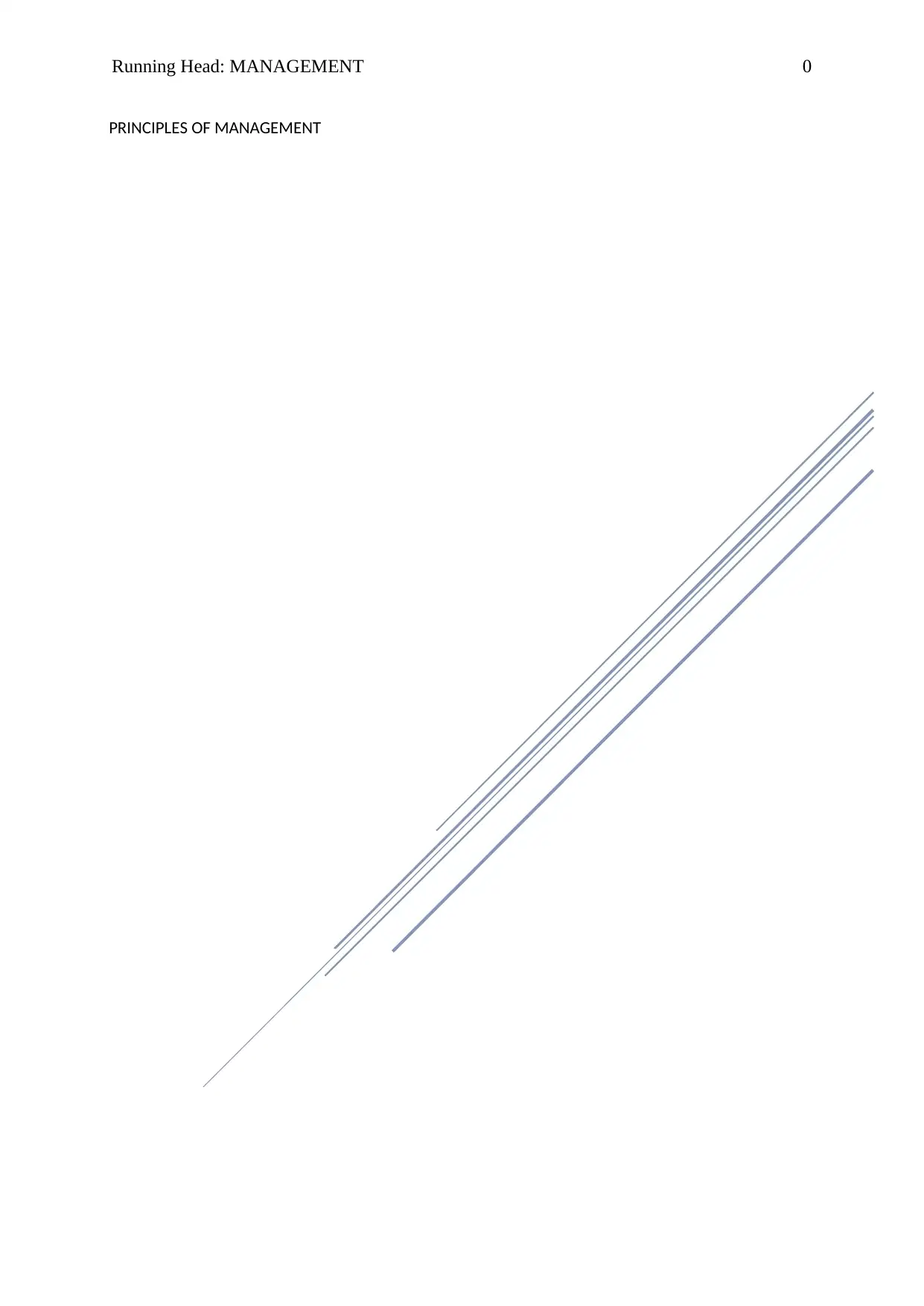
Running Head: MANAGEMENT 0
PRINCIPLES OF MANAGEMENT
PRINCIPLES OF MANAGEMENT
Secure Best Marks with AI Grader
Need help grading? Try our AI Grader for instant feedback on your assignments.
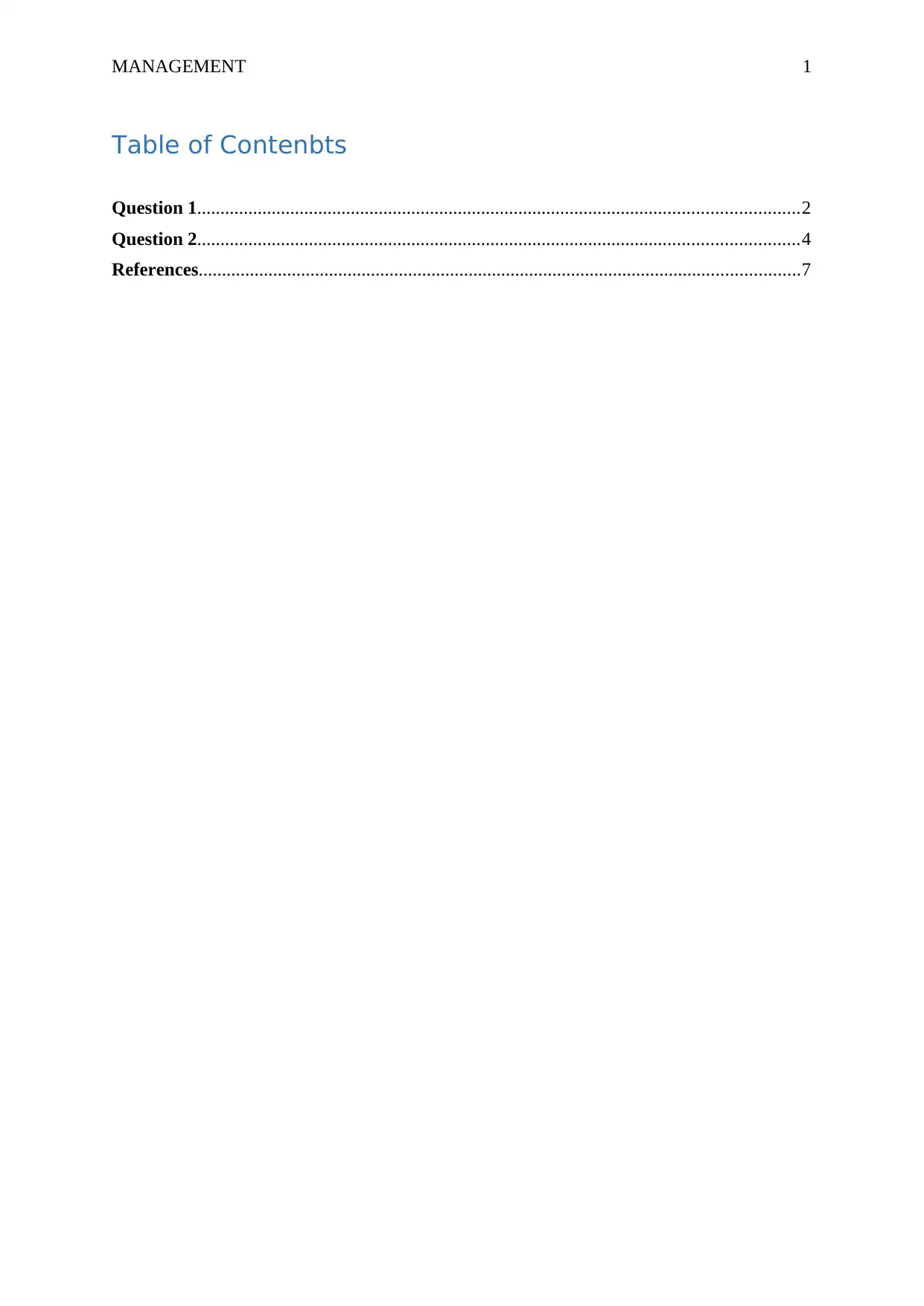
MANAGEMENT 1
Table of Contenbts
Question 1.................................................................................................................................2
Question 2.................................................................................................................................4
References.................................................................................................................................7
Table of Contenbts
Question 1.................................................................................................................................2
Question 2.................................................................................................................................4
References.................................................................................................................................7
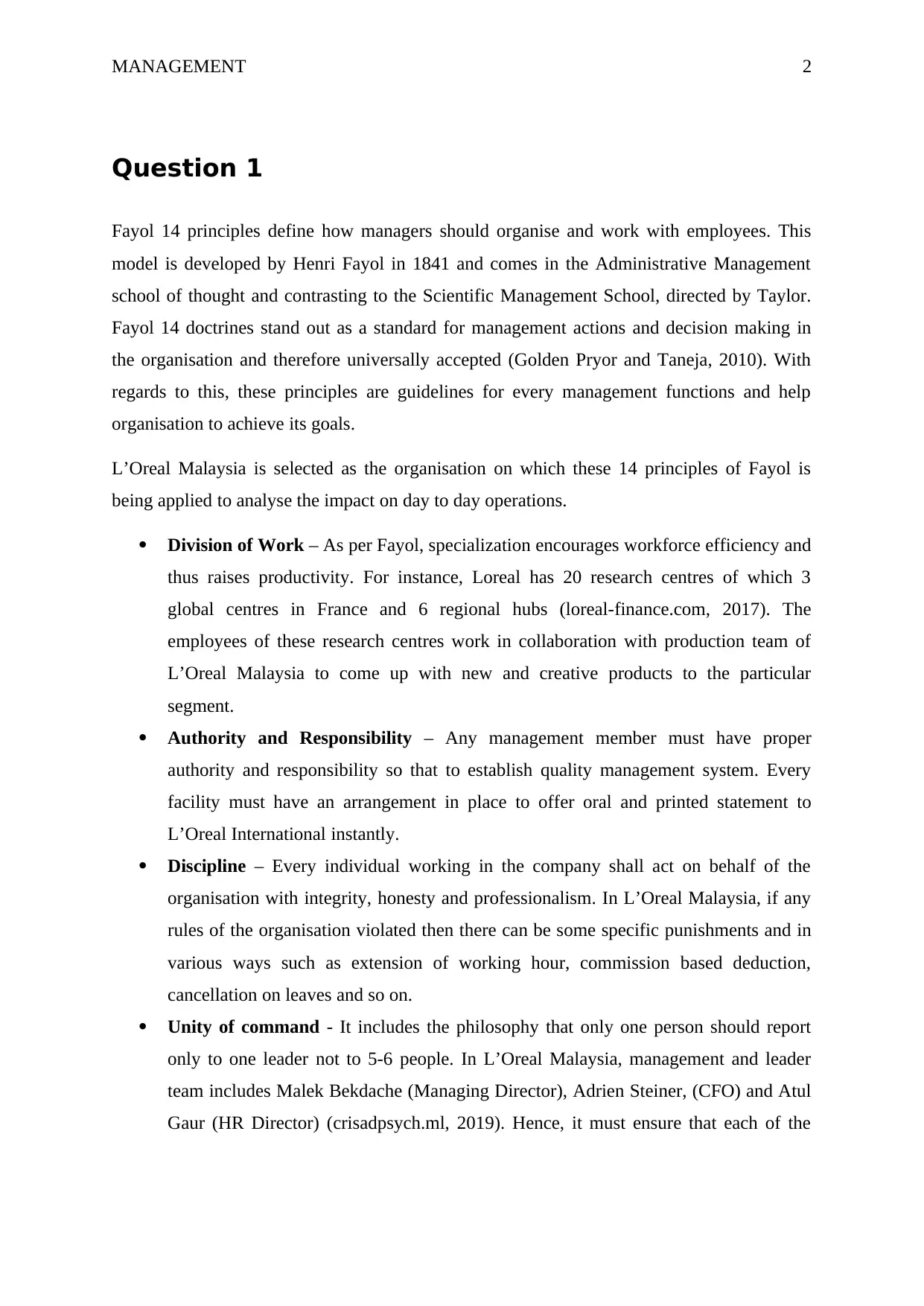
MANAGEMENT 2
Question 1
Fayol 14 principles define how managers should organise and work with employees. This
model is developed by Henri Fayol in 1841 and comes in the Administrative Management
school of thought and contrasting to the Scientific Management School, directed by Taylor.
Fayol 14 doctrines stand out as a standard for management actions and decision making in
the organisation and therefore universally accepted (Golden Pryor and Taneja, 2010). With
regards to this, these principles are guidelines for every management functions and help
organisation to achieve its goals.
L’Oreal Malaysia is selected as the organisation on which these 14 principles of Fayol is
being applied to analyse the impact on day to day operations.
Division of Work – As per Fayol, specialization encourages workforce efficiency and
thus raises productivity. For instance, Loreal has 20 research centres of which 3
global centres in France and 6 regional hubs (loreal-finance.com, 2017). The
employees of these research centres work in collaboration with production team of
L’Oreal Malaysia to come up with new and creative products to the particular
segment.
Authority and Responsibility – Any management member must have proper
authority and responsibility so that to establish quality management system. Every
facility must have an arrangement in place to offer oral and printed statement to
L’Oreal International instantly.
Discipline – Every individual working in the company shall act on behalf of the
organisation with integrity, honesty and professionalism. In L’Oreal Malaysia, if any
rules of the organisation violated then there can be some specific punishments and in
various ways such as extension of working hour, commission based deduction,
cancellation on leaves and so on.
Unity of command - It includes the philosophy that only one person should report
only to one leader not to 5-6 people. In L’Oreal Malaysia, management and leader
team includes Malek Bekdache (Managing Director), Adrien Steiner, (CFO) and Atul
Gaur (HR Director) (crisadpsych.ml, 2019). Hence, it must ensure that each of the
Question 1
Fayol 14 principles define how managers should organise and work with employees. This
model is developed by Henri Fayol in 1841 and comes in the Administrative Management
school of thought and contrasting to the Scientific Management School, directed by Taylor.
Fayol 14 doctrines stand out as a standard for management actions and decision making in
the organisation and therefore universally accepted (Golden Pryor and Taneja, 2010). With
regards to this, these principles are guidelines for every management functions and help
organisation to achieve its goals.
L’Oreal Malaysia is selected as the organisation on which these 14 principles of Fayol is
being applied to analyse the impact on day to day operations.
Division of Work – As per Fayol, specialization encourages workforce efficiency and
thus raises productivity. For instance, Loreal has 20 research centres of which 3
global centres in France and 6 regional hubs (loreal-finance.com, 2017). The
employees of these research centres work in collaboration with production team of
L’Oreal Malaysia to come up with new and creative products to the particular
segment.
Authority and Responsibility – Any management member must have proper
authority and responsibility so that to establish quality management system. Every
facility must have an arrangement in place to offer oral and printed statement to
L’Oreal International instantly.
Discipline – Every individual working in the company shall act on behalf of the
organisation with integrity, honesty and professionalism. In L’Oreal Malaysia, if any
rules of the organisation violated then there can be some specific punishments and in
various ways such as extension of working hour, commission based deduction,
cancellation on leaves and so on.
Unity of command - It includes the philosophy that only one person should report
only to one leader not to 5-6 people. In L’Oreal Malaysia, management and leader
team includes Malek Bekdache (Managing Director), Adrien Steiner, (CFO) and Atul
Gaur (HR Director) (crisadpsych.ml, 2019). Hence, it must ensure that each of the
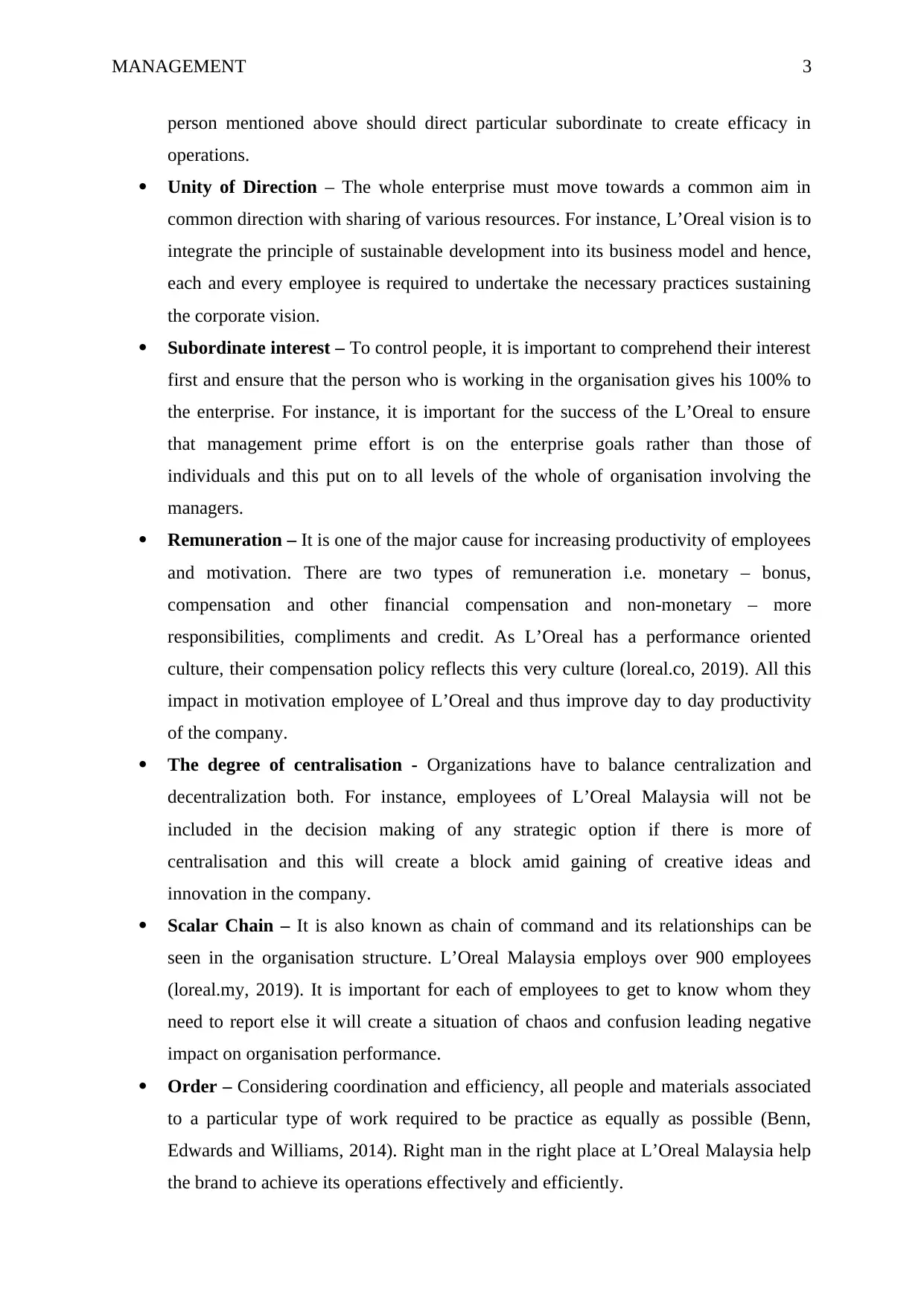
MANAGEMENT 3
person mentioned above should direct particular subordinate to create efficacy in
operations.
Unity of Direction – The whole enterprise must move towards a common aim in
common direction with sharing of various resources. For instance, L’Oreal vision is to
integrate the principle of sustainable development into its business model and hence,
each and every employee is required to undertake the necessary practices sustaining
the corporate vision.
Subordinate interest – To control people, it is important to comprehend their interest
first and ensure that the person who is working in the organisation gives his 100% to
the enterprise. For instance, it is important for the success of the L’Oreal to ensure
that management prime effort is on the enterprise goals rather than those of
individuals and this put on to all levels of the whole of organisation involving the
managers.
Remuneration – It is one of the major cause for increasing productivity of employees
and motivation. There are two types of remuneration i.e. monetary – bonus,
compensation and other financial compensation and non-monetary – more
responsibilities, compliments and credit. As L’Oreal has a performance oriented
culture, their compensation policy reflects this very culture (loreal.co, 2019). All this
impact in motivation employee of L’Oreal and thus improve day to day productivity
of the company.
The degree of centralisation - Organizations have to balance centralization and
decentralization both. For instance, employees of L’Oreal Malaysia will not be
included in the decision making of any strategic option if there is more of
centralisation and this will create a block amid gaining of creative ideas and
innovation in the company.
Scalar Chain – It is also known as chain of command and its relationships can be
seen in the organisation structure. L’Oreal Malaysia employs over 900 employees
(loreal.my, 2019). It is important for each of employees to get to know whom they
need to report else it will create a situation of chaos and confusion leading negative
impact on organisation performance.
Order – Considering coordination and efficiency, all people and materials associated
to a particular type of work required to be practice as equally as possible (Benn,
Edwards and Williams, 2014). Right man in the right place at L’Oreal Malaysia help
the brand to achieve its operations effectively and efficiently.
person mentioned above should direct particular subordinate to create efficacy in
operations.
Unity of Direction – The whole enterprise must move towards a common aim in
common direction with sharing of various resources. For instance, L’Oreal vision is to
integrate the principle of sustainable development into its business model and hence,
each and every employee is required to undertake the necessary practices sustaining
the corporate vision.
Subordinate interest – To control people, it is important to comprehend their interest
first and ensure that the person who is working in the organisation gives his 100% to
the enterprise. For instance, it is important for the success of the L’Oreal to ensure
that management prime effort is on the enterprise goals rather than those of
individuals and this put on to all levels of the whole of organisation involving the
managers.
Remuneration – It is one of the major cause for increasing productivity of employees
and motivation. There are two types of remuneration i.e. monetary – bonus,
compensation and other financial compensation and non-monetary – more
responsibilities, compliments and credit. As L’Oreal has a performance oriented
culture, their compensation policy reflects this very culture (loreal.co, 2019). All this
impact in motivation employee of L’Oreal and thus improve day to day productivity
of the company.
The degree of centralisation - Organizations have to balance centralization and
decentralization both. For instance, employees of L’Oreal Malaysia will not be
included in the decision making of any strategic option if there is more of
centralisation and this will create a block amid gaining of creative ideas and
innovation in the company.
Scalar Chain – It is also known as chain of command and its relationships can be
seen in the organisation structure. L’Oreal Malaysia employs over 900 employees
(loreal.my, 2019). It is important for each of employees to get to know whom they
need to report else it will create a situation of chaos and confusion leading negative
impact on organisation performance.
Order – Considering coordination and efficiency, all people and materials associated
to a particular type of work required to be practice as equally as possible (Benn,
Edwards and Williams, 2014). Right man in the right place at L’Oreal Malaysia help
the brand to achieve its operations effectively and efficiently.
Secure Best Marks with AI Grader
Need help grading? Try our AI Grader for instant feedback on your assignments.
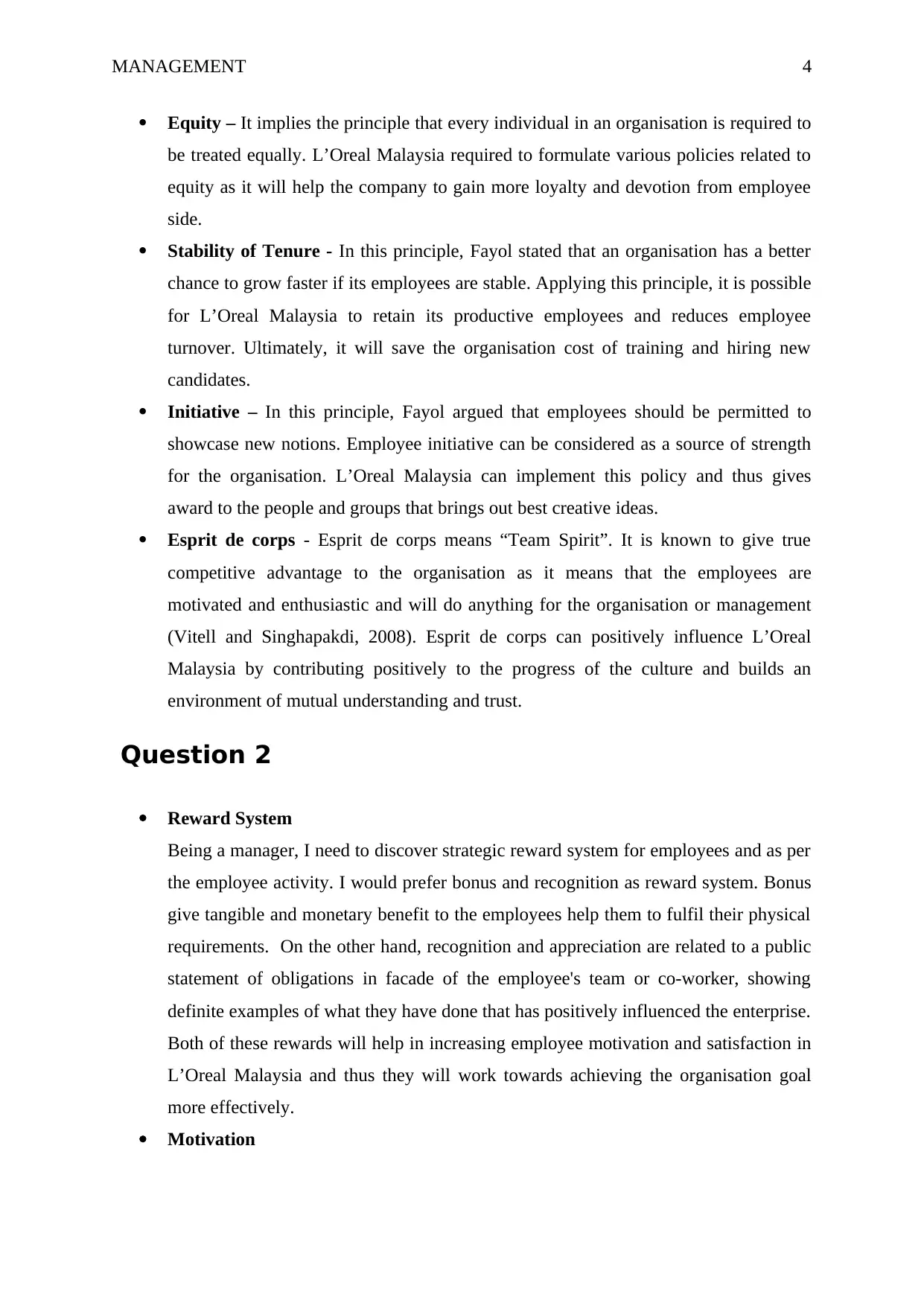
MANAGEMENT 4
Equity – It implies the principle that every individual in an organisation is required to
be treated equally. L’Oreal Malaysia required to formulate various policies related to
equity as it will help the company to gain more loyalty and devotion from employee
side.
Stability of Tenure - In this principle, Fayol stated that an organisation has a better
chance to grow faster if its employees are stable. Applying this principle, it is possible
for L’Oreal Malaysia to retain its productive employees and reduces employee
turnover. Ultimately, it will save the organisation cost of training and hiring new
candidates.
Initiative – In this principle, Fayol argued that employees should be permitted to
showcase new notions. Employee initiative can be considered as a source of strength
for the organisation. L’Oreal Malaysia can implement this policy and thus gives
award to the people and groups that brings out best creative ideas.
Esprit de corps - Esprit de corps means “Team Spirit”. It is known to give true
competitive advantage to the organisation as it means that the employees are
motivated and enthusiastic and will do anything for the organisation or management
(Vitell and Singhapakdi, 2008). Esprit de corps can positively influence L’Oreal
Malaysia by contributing positively to the progress of the culture and builds an
environment of mutual understanding and trust.
Question 2
Reward System
Being a manager, I need to discover strategic reward system for employees and as per
the employee activity. I would prefer bonus and recognition as reward system. Bonus
give tangible and monetary benefit to the employees help them to fulfil their physical
requirements. On the other hand, recognition and appreciation are related to a public
statement of obligations in facade of the employee's team or co-worker, showing
definite examples of what they have done that has positively influenced the enterprise.
Both of these rewards will help in increasing employee motivation and satisfaction in
L’Oreal Malaysia and thus they will work towards achieving the organisation goal
more effectively.
Motivation
Equity – It implies the principle that every individual in an organisation is required to
be treated equally. L’Oreal Malaysia required to formulate various policies related to
equity as it will help the company to gain more loyalty and devotion from employee
side.
Stability of Tenure - In this principle, Fayol stated that an organisation has a better
chance to grow faster if its employees are stable. Applying this principle, it is possible
for L’Oreal Malaysia to retain its productive employees and reduces employee
turnover. Ultimately, it will save the organisation cost of training and hiring new
candidates.
Initiative – In this principle, Fayol argued that employees should be permitted to
showcase new notions. Employee initiative can be considered as a source of strength
for the organisation. L’Oreal Malaysia can implement this policy and thus gives
award to the people and groups that brings out best creative ideas.
Esprit de corps - Esprit de corps means “Team Spirit”. It is known to give true
competitive advantage to the organisation as it means that the employees are
motivated and enthusiastic and will do anything for the organisation or management
(Vitell and Singhapakdi, 2008). Esprit de corps can positively influence L’Oreal
Malaysia by contributing positively to the progress of the culture and builds an
environment of mutual understanding and trust.
Question 2
Reward System
Being a manager, I need to discover strategic reward system for employees and as per
the employee activity. I would prefer bonus and recognition as reward system. Bonus
give tangible and monetary benefit to the employees help them to fulfil their physical
requirements. On the other hand, recognition and appreciation are related to a public
statement of obligations in facade of the employee's team or co-worker, showing
definite examples of what they have done that has positively influenced the enterprise.
Both of these rewards will help in increasing employee motivation and satisfaction in
L’Oreal Malaysia and thus they will work towards achieving the organisation goal
more effectively.
Motivation
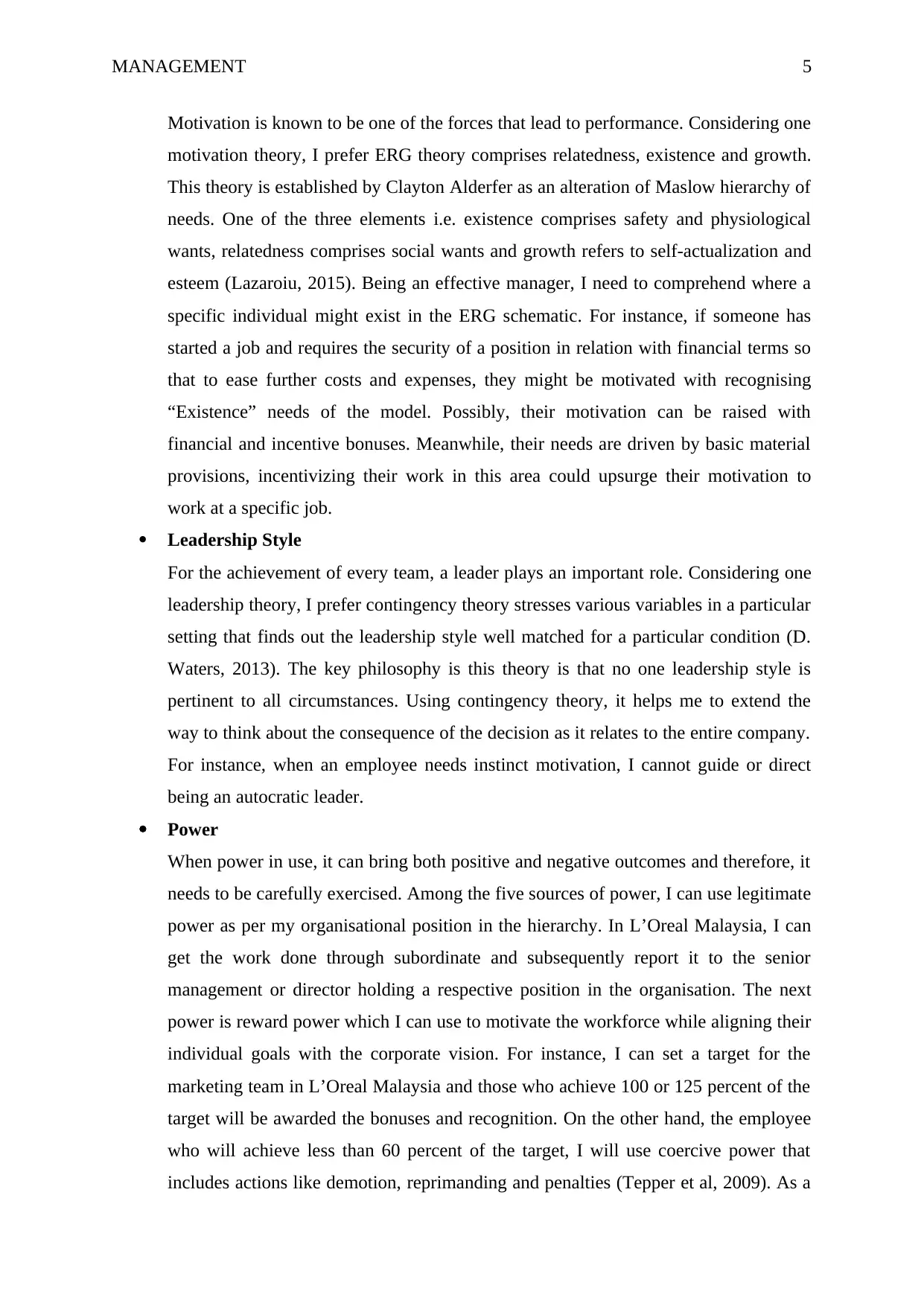
MANAGEMENT 5
Motivation is known to be one of the forces that lead to performance. Considering one
motivation theory, I prefer ERG theory comprises relatedness, existence and growth.
This theory is established by Clayton Alderfer as an alteration of Maslow hierarchy of
needs. One of the three elements i.e. existence comprises safety and physiological
wants, relatedness comprises social wants and growth refers to self-actualization and
esteem (Lazaroiu, 2015). Being an effective manager, I need to comprehend where a
specific individual might exist in the ERG schematic. For instance, if someone has
started a job and requires the security of a position in relation with financial terms so
that to ease further costs and expenses, they might be motivated with recognising
“Existence” needs of the model. Possibly, their motivation can be raised with
financial and incentive bonuses. Meanwhile, their needs are driven by basic material
provisions, incentivizing their work in this area could upsurge their motivation to
work at a specific job.
Leadership Style
For the achievement of every team, a leader plays an important role. Considering one
leadership theory, I prefer contingency theory stresses various variables in a particular
setting that finds out the leadership style well matched for a particular condition (D.
Waters, 2013). The key philosophy is this theory is that no one leadership style is
pertinent to all circumstances. Using contingency theory, it helps me to extend the
way to think about the consequence of the decision as it relates to the entire company.
For instance, when an employee needs instinct motivation, I cannot guide or direct
being an autocratic leader.
Power
When power in use, it can bring both positive and negative outcomes and therefore, it
needs to be carefully exercised. Among the five sources of power, I can use legitimate
power as per my organisational position in the hierarchy. In L’Oreal Malaysia, I can
get the work done through subordinate and subsequently report it to the senior
management or director holding a respective position in the organisation. The next
power is reward power which I can use to motivate the workforce while aligning their
individual goals with the corporate vision. For instance, I can set a target for the
marketing team in L’Oreal Malaysia and those who achieve 100 or 125 percent of the
target will be awarded the bonuses and recognition. On the other hand, the employee
who will achieve less than 60 percent of the target, I will use coercive power that
includes actions like demotion, reprimanding and penalties (Tepper et al, 2009). As a
Motivation is known to be one of the forces that lead to performance. Considering one
motivation theory, I prefer ERG theory comprises relatedness, existence and growth.
This theory is established by Clayton Alderfer as an alteration of Maslow hierarchy of
needs. One of the three elements i.e. existence comprises safety and physiological
wants, relatedness comprises social wants and growth refers to self-actualization and
esteem (Lazaroiu, 2015). Being an effective manager, I need to comprehend where a
specific individual might exist in the ERG schematic. For instance, if someone has
started a job and requires the security of a position in relation with financial terms so
that to ease further costs and expenses, they might be motivated with recognising
“Existence” needs of the model. Possibly, their motivation can be raised with
financial and incentive bonuses. Meanwhile, their needs are driven by basic material
provisions, incentivizing their work in this area could upsurge their motivation to
work at a specific job.
Leadership Style
For the achievement of every team, a leader plays an important role. Considering one
leadership theory, I prefer contingency theory stresses various variables in a particular
setting that finds out the leadership style well matched for a particular condition (D.
Waters, 2013). The key philosophy is this theory is that no one leadership style is
pertinent to all circumstances. Using contingency theory, it helps me to extend the
way to think about the consequence of the decision as it relates to the entire company.
For instance, when an employee needs instinct motivation, I cannot guide or direct
being an autocratic leader.
Power
When power in use, it can bring both positive and negative outcomes and therefore, it
needs to be carefully exercised. Among the five sources of power, I can use legitimate
power as per my organisational position in the hierarchy. In L’Oreal Malaysia, I can
get the work done through subordinate and subsequently report it to the senior
management or director holding a respective position in the organisation. The next
power is reward power which I can use to motivate the workforce while aligning their
individual goals with the corporate vision. For instance, I can set a target for the
marketing team in L’Oreal Malaysia and those who achieve 100 or 125 percent of the
target will be awarded the bonuses and recognition. On the other hand, the employee
who will achieve less than 60 percent of the target, I will use coercive power that
includes actions like demotion, reprimanding and penalties (Tepper et al, 2009). As a
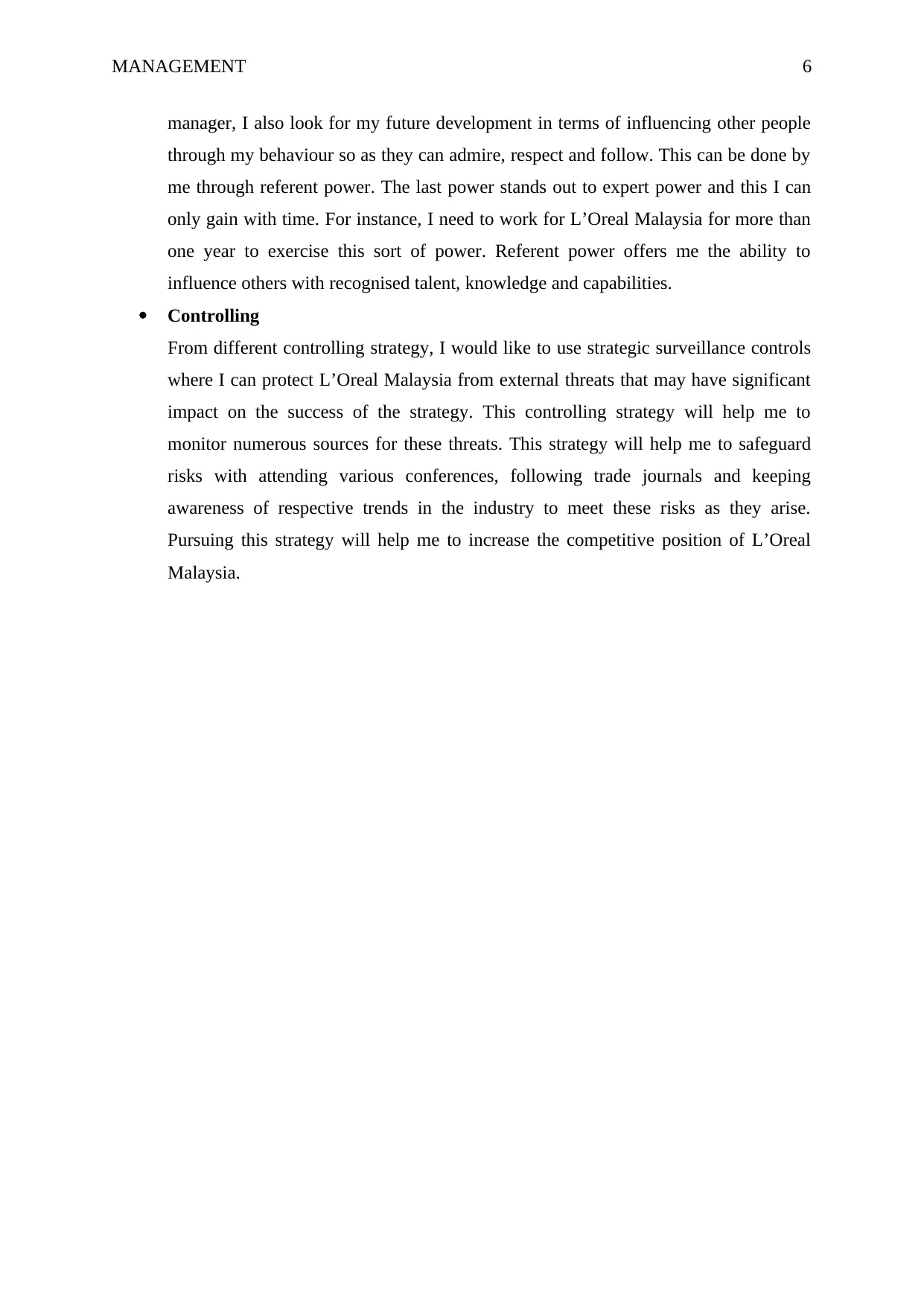
MANAGEMENT 6
manager, I also look for my future development in terms of influencing other people
through my behaviour so as they can admire, respect and follow. This can be done by
me through referent power. The last power stands out to expert power and this I can
only gain with time. For instance, I need to work for L’Oreal Malaysia for more than
one year to exercise this sort of power. Referent power offers me the ability to
influence others with recognised talent, knowledge and capabilities.
Controlling
From different controlling strategy, I would like to use strategic surveillance controls
where I can protect L’Oreal Malaysia from external threats that may have significant
impact on the success of the strategy. This controlling strategy will help me to
monitor numerous sources for these threats. This strategy will help me to safeguard
risks with attending various conferences, following trade journals and keeping
awareness of respective trends in the industry to meet these risks as they arise.
Pursuing this strategy will help me to increase the competitive position of L’Oreal
Malaysia.
manager, I also look for my future development in terms of influencing other people
through my behaviour so as they can admire, respect and follow. This can be done by
me through referent power. The last power stands out to expert power and this I can
only gain with time. For instance, I need to work for L’Oreal Malaysia for more than
one year to exercise this sort of power. Referent power offers me the ability to
influence others with recognised talent, knowledge and capabilities.
Controlling
From different controlling strategy, I would like to use strategic surveillance controls
where I can protect L’Oreal Malaysia from external threats that may have significant
impact on the success of the strategy. This controlling strategy will help me to
monitor numerous sources for these threats. This strategy will help me to safeguard
risks with attending various conferences, following trade journals and keeping
awareness of respective trends in the industry to meet these risks as they arise.
Pursuing this strategy will help me to increase the competitive position of L’Oreal
Malaysia.
Paraphrase This Document
Need a fresh take? Get an instant paraphrase of this document with our AI Paraphraser
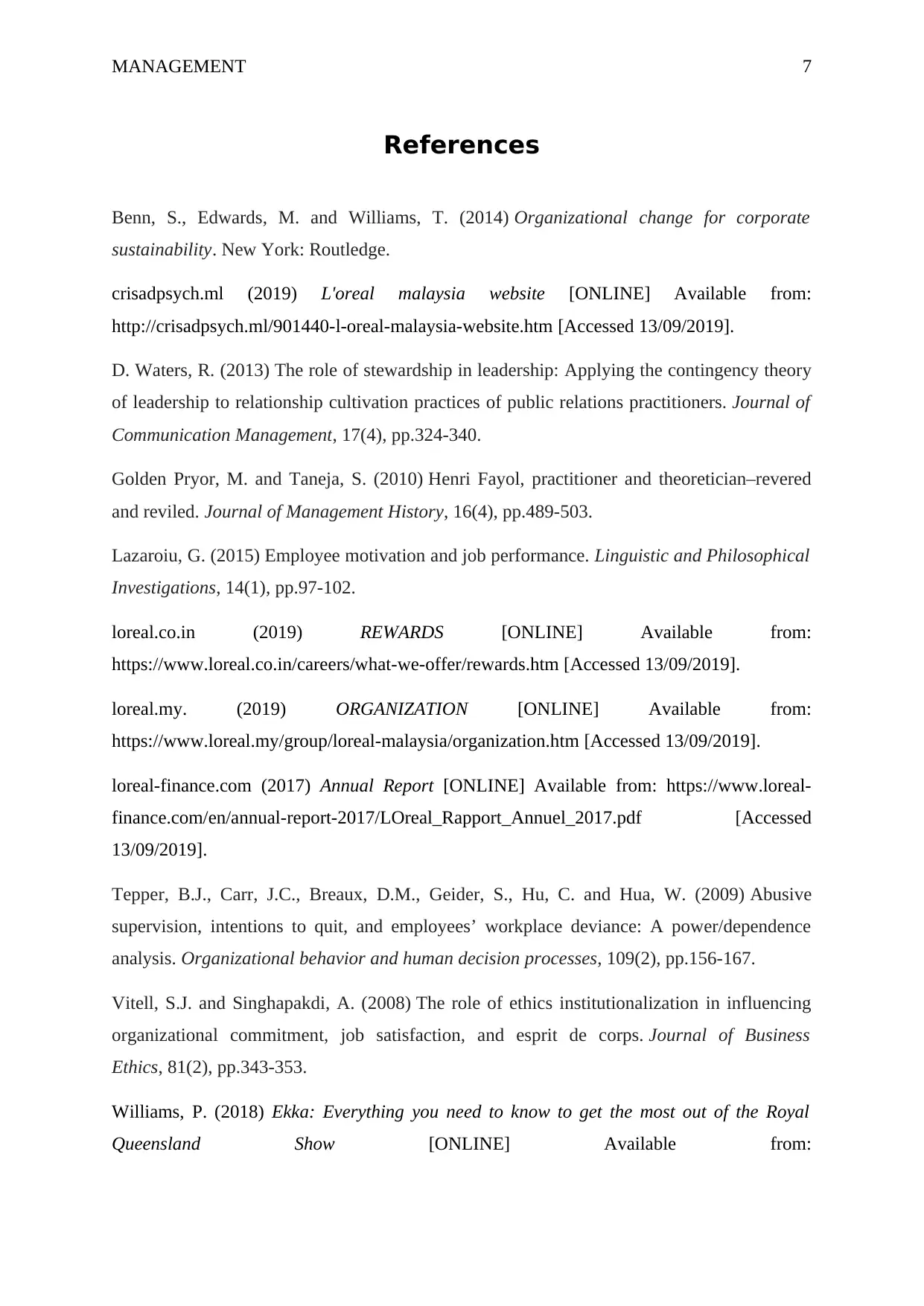
MANAGEMENT 7
References
Benn, S., Edwards, M. and Williams, T. (2014) Organizational change for corporate
sustainability. New York: Routledge.
crisadpsych.ml (2019) L'oreal malaysia website [ONLINE] Available from:
http://crisadpsych.ml/901440-l-oreal-malaysia-website.htm [Accessed 13/09/2019].
D. Waters, R. (2013) The role of stewardship in leadership: Applying the contingency theory
of leadership to relationship cultivation practices of public relations practitioners. Journal of
Communication Management, 17(4), pp.324-340.
Golden Pryor, M. and Taneja, S. (2010) Henri Fayol, practitioner and theoretician–revered
and reviled. Journal of Management History, 16(4), pp.489-503.
Lazaroiu, G. (2015) Employee motivation and job performance. Linguistic and Philosophical
Investigations, 14(1), pp.97-102.
loreal.co.in (2019) REWARDS [ONLINE] Available from:
https://www.loreal.co.in/careers/what-we-offer/rewards.htm [Accessed 13/09/2019].
loreal.my. (2019) ORGANIZATION [ONLINE] Available from:
https://www.loreal.my/group/loreal-malaysia/organization.htm [Accessed 13/09/2019].
loreal-finance.com (2017) Annual Report [ONLINE] Available from: https://www.loreal-
finance.com/en/annual-report-2017/LOreal_Rapport_Annuel_2017.pdf [Accessed
13/09/2019].
Tepper, B.J., Carr, J.C., Breaux, D.M., Geider, S., Hu, C. and Hua, W. (2009) Abusive
supervision, intentions to quit, and employees’ workplace deviance: A power/dependence
analysis. Organizational behavior and human decision processes, 109(2), pp.156-167.
Vitell, S.J. and Singhapakdi, A. (2008) The role of ethics institutionalization in influencing
organizational commitment, job satisfaction, and esprit de corps. Journal of Business
Ethics, 81(2), pp.343-353.
Williams, P. (2018) Ekka: Everything you need to know to get the most out of the Royal
Queensland Show [ONLINE] Available from:
References
Benn, S., Edwards, M. and Williams, T. (2014) Organizational change for corporate
sustainability. New York: Routledge.
crisadpsych.ml (2019) L'oreal malaysia website [ONLINE] Available from:
http://crisadpsych.ml/901440-l-oreal-malaysia-website.htm [Accessed 13/09/2019].
D. Waters, R. (2013) The role of stewardship in leadership: Applying the contingency theory
of leadership to relationship cultivation practices of public relations practitioners. Journal of
Communication Management, 17(4), pp.324-340.
Golden Pryor, M. and Taneja, S. (2010) Henri Fayol, practitioner and theoretician–revered
and reviled. Journal of Management History, 16(4), pp.489-503.
Lazaroiu, G. (2015) Employee motivation and job performance. Linguistic and Philosophical
Investigations, 14(1), pp.97-102.
loreal.co.in (2019) REWARDS [ONLINE] Available from:
https://www.loreal.co.in/careers/what-we-offer/rewards.htm [Accessed 13/09/2019].
loreal.my. (2019) ORGANIZATION [ONLINE] Available from:
https://www.loreal.my/group/loreal-malaysia/organization.htm [Accessed 13/09/2019].
loreal-finance.com (2017) Annual Report [ONLINE] Available from: https://www.loreal-
finance.com/en/annual-report-2017/LOreal_Rapport_Annuel_2017.pdf [Accessed
13/09/2019].
Tepper, B.J., Carr, J.C., Breaux, D.M., Geider, S., Hu, C. and Hua, W. (2009) Abusive
supervision, intentions to quit, and employees’ workplace deviance: A power/dependence
analysis. Organizational behavior and human decision processes, 109(2), pp.156-167.
Vitell, S.J. and Singhapakdi, A. (2008) The role of ethics institutionalization in influencing
organizational commitment, job satisfaction, and esprit de corps. Journal of Business
Ethics, 81(2), pp.343-353.
Williams, P. (2018) Ekka: Everything you need to know to get the most out of the Royal
Queensland Show [ONLINE] Available from:
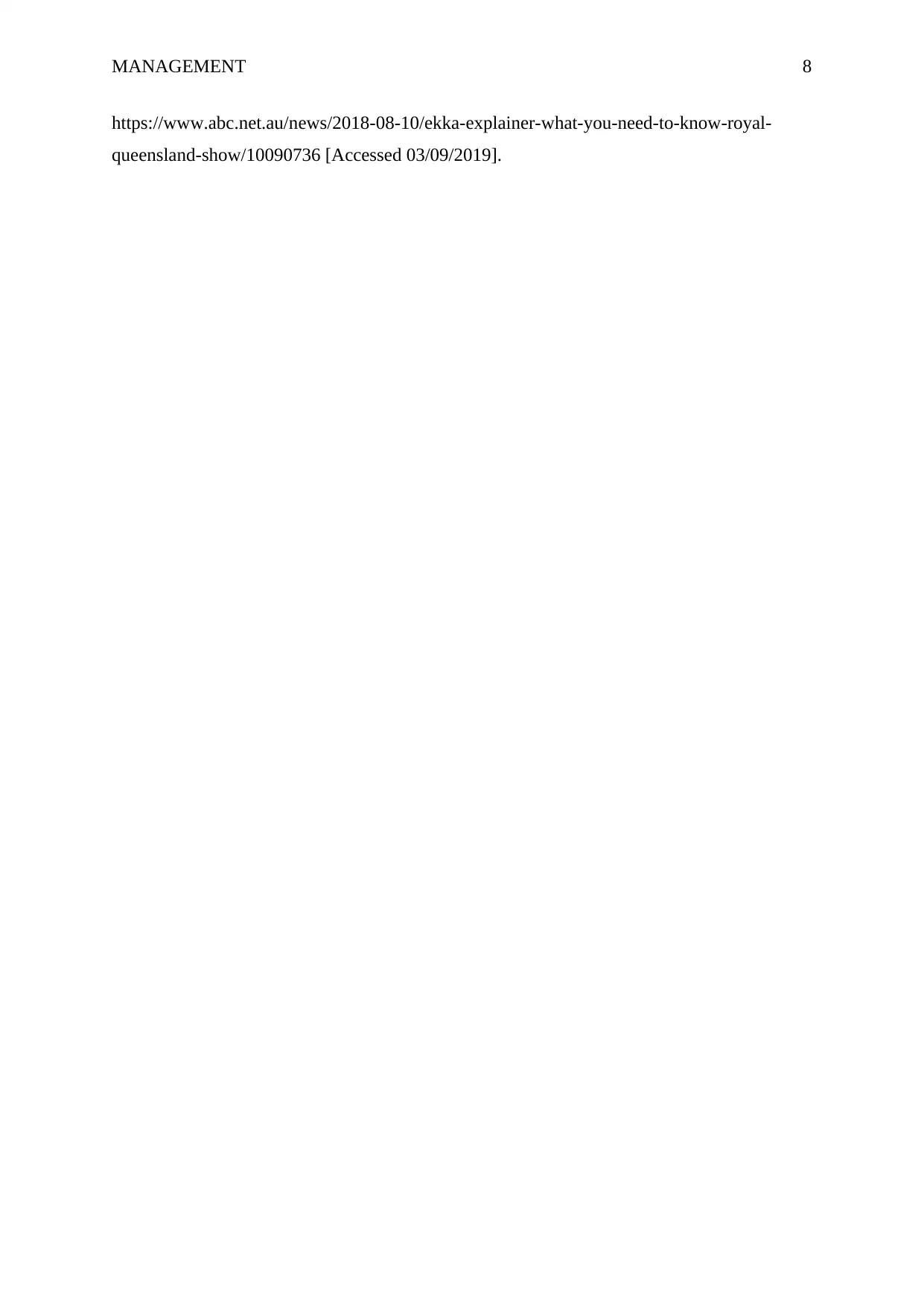
MANAGEMENT 8
https://www.abc.net.au/news/2018-08-10/ekka-explainer-what-you-need-to-know-royal-
queensland-show/10090736 [Accessed 03/09/2019].
https://www.abc.net.au/news/2018-08-10/ekka-explainer-what-you-need-to-know-royal-
queensland-show/10090736 [Accessed 03/09/2019].
1 out of 9
Related Documents
Your All-in-One AI-Powered Toolkit for Academic Success.
+13062052269
info@desklib.com
Available 24*7 on WhatsApp / Email
![[object Object]](/_next/static/media/star-bottom.7253800d.svg)
Unlock your academic potential
© 2024 | Zucol Services PVT LTD | All rights reserved.





